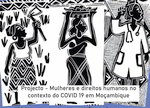Women, Power and Tradition in Mozambique
by Ana M. Loforte
Published in: Outras Vozes, Suplemento do boletim n° 3, July 2003
The major economic and social changes that have occurred in Mozambique in recent decades as a result of new policies linked to structural adjustment programmes, the impact of the war and ensuing population movements have had profound repercussions on people’s lives and changed their ways of life. However, we cannot interpret this new context as being synonymous with the destruction of existing social institutions. In truth, although mutations have changed the way they function, new reconstruction, reorganisation and reintegration processes are set in motion, with greater or lesser speed, to meet the hostile challenges arising in a crisis situation.
At the same time, there is evidence of that certain values linked to tradition are, to a degree, being preserved and use is being made of resources gathered from the past. In truth, in the face of a wider movement whose aim was to bring about profound changes in social relations, traditional practices did not undergo any fundamental changes and nor did they dissipate. They simply became clandestine, in order to get around the discouragement contained in political discourse (Andrade, Osório e Trindade, 2000).
The revival of cultural expressions in a context within which tradition had adjusted to new realities has made the subordinate position of women worse, because certain aspects of this position undergo a filtering process and they are derived from the abilities and manipulation capacity of those who hand them down. The particular usefulness of a tradition is to allow and offer, to all those who enunciate and reproduce it in day to day life, a means to affirm their differences and secure their authority and power (Lenclud, 1987: 118). Thus it can be understood that, in the name of tradition, some neighbourhoods on the outskirts of Maputo City, for example, still maintain rigid patterns of male authority and domination in defining marriage strategies, controlling sexuality and female reproductive capacity and in traditional religious practices.
The data presented below (based on research conducted in neighbourhoods on the outskirts of Maputo City)1 seeks to demonstrate how, in an urban environment of major social change, where heterogeneous thought systems and practices prevail, continuity in relation to tradition tries to secure power, male authority and the dominant patriarchal ideology.
It can be seen that tradition poses a choice arising from a code of meanings, of values that govern individual and collective behaviour handed down from generation to generation. Tradition is an inheritance that defines and hands down an order, erasing the transforming effect of time, keeping only the crucial moments by which those who hand down the order can legitimate their power and influence (Balandier 1988; 36).
Kinship and alliances
Even in an urban context, kinship relationships make the process of production and development of social life effective, since it is at the heart of these relationships that the main decisions are taken and social life is controlled. Because a traditional system prevails in some household units, men maintain forms of political power the exercise of which is materialised by their imposing their will in decisions about matrimonial strategies and alliances. As producers in the division of labour and producers of new producers, women are at the centre of strategies emanating from the protagonist, older male members, who seek a “good marriage”; that is, they seek to maximise the economic and symbolic benefits associated with the establishment of a new relationship.
The ceremony in which matrimonial compensation, or lobolo, is handed over is preceded, accompanied and continued by exchanges of gifts and other goods at different points in time2. This shows that alliances are not simply matrimonial but involve issues of social reproduction3, reinforcing the power and authority of older males. Upon joining the two people, matrimonial compensation sets in motion two circles moving in opposite directions and in separate spheres, ensuring the reproduction of the matrimonial system, expressed in an exchange of women for goods and monetary and symbolic values, where the elders have an interest in keeping their top positions. It is in this context that Meillassoux (1970:271) says “que uma vez que os jovens são os produtores de bens, estariam em condições de tratar directamente com o guardião das mulheres que desejam desposar. Mas o ancião de um grupo não se prestará a uma tal transacção com um indivíduo que não tem o estatuto requerido; enfraqueceria a autoridade do seu homólogo e na volta também a sua. Os anciãos têm interesse solidário em respeitar a ordem estabelecida”. [Since the young are the producers of goods, they should be in a position to deal directly with the guardian of women who wish to wed. But the elder of a group would not be willing to accept such a transaction with an individual who does not have the required status; it would weaken the authority of his counterpart and in turn his own as well. The elders have a common interest in upholding the established order].
Sexuality
In the name of tradition and traditional values, sexuality, through its own rules and discourses, also legitimises forms of male domination and gender inequality affecting individuals in distinct spheres, in particular their bodies, the use of these and control over reproduction. A woman’s body is subject to contention, but also to constant ritualisation, prescribed meticulously by the purification to which women are periodically subjected. Women are polluters4 because of their regular exposure to menstruation and childbirth, and so they are permanently linked to organic pollution (Perez 1996:46).
Patriarchal ideology advocates that sexuality is the place for production of descendants, who will ensure continuity of the group, as loyal subjects supplying labour power. However, this same ideology that instils in young women that obedience is a value and motherhood is a norm legitimates different rights and roles for men and women in terms of procreation. Thus, it is the man’s initiative to sow the “seed”5 and the permanence of fertility. Women are passive receptacles; wombs where children generated above all by the male contribution grow.
The most evident function of a woman is as a reproducer of the group. When she contracts marriage, she should, before all else, become a mother, which entails strict control by the group over her sexuality in order to ensure an increase in active members. In general, girls are discouraged from having premarital sexual relations, both by their families and by the churches, which condemn such relations through their teachings. On the other hand, for boys, such relations are tacitly approved and, in a way, encouraged. Sexual ethics restrict and control the free expression of female sexuality. By virtue of women’s reproductive function, female sexuality is limited to the sphere of marriage.
Some anomalies in children’s development are attributed to sexuality that deviates from the rules of tradition, such as forbidden coupling that brings about negative effects.
From what we have just said, it seems to us that the men of the present interpret the past according to current interests. As Lenclud (1987:116) says, “Il ne s´agit pas de plaquer le present sur le passé mais de trouver dans celui-ci l´esquisse des solutions que nos croyons justes aujourd´hui.” To which we might add that, apart from justness, tradition seeks to secure the authority and power of those who hand it down.
Religion
Another aspect that is linked to continuity in relation to tradition and seeks to secure the power and authority of older men is found in traditional religious practices6. In these practices, senior members of domestic units, ritually linked to the ancestors who handed down their functions, privileges and powers, find the basis and justification for their position and duties. Religion reproduces the ideology of patriarchal power expressing gender differences. With the exception of the paternal aunt7, religious power belongs predominantly to men. In ancestral cults, the right to officiate is reserved for the older, male individuals. Presenting themselves as priests and wizards who can ensure the protection of the spirits and defeat aggressive forces, the officiators organise and preside over rituals to maintain order and well being.
The subordinate position of women in religion is still visible in the zione religious sects, which involve elements of local cultural traditions, such as respect for ancestral cults, divination, cure rituals, the symbolism of colours, etc. As a result, male dominance, based on religious dogma and rituals, is present in this religious congregation. Women, marked by biological cycles (menstruation and childbirth), are normally excluded from the higher echelons of the hierarchy and from decision-making. There are a small number of exceptions, of women who have attained posts of bishops and deacons, but this is always through their spouses, who have ascended to these positions themselves. But when women take up these positions this does not alter the balance of power, since they do not preside over rituals and they loose their status upon the death or dismissal of their spouses.
Conclusion
Our concern has been to identify elements of the past that can still be observed today (and to some extent constitute a heritage), and to try to explain why tradition is kept and preserved. We saw that tradition fulfils social functions, but above all it allows forms of political power and male domination to be maintained, as is manifested in the imposition of the male will in decisions about matrimonial strategies, regulating fertility and relations with the imaginary, expressed in ritual activity.
Although, with regard to some practices the equation tradition=conservation can be established, tradition should manifest a singular capacity for variation and allow those who use it a margin of freedom. In effect, as Giddens (1994: 72) says, (…) “todas as tradições são, de facto, escolhas de entre um leque indefinido de possíveis padrões de comportamento”. [All traditions are, in fact, choices from an infinite range of possible patterns of behaviour].
However, in the context under analysis, to talk of several choices does not mean that these choices are open to everybody or that all people make all the decisions on possible options. In reality, for women, this choice is restricted or limited and the behaviour patterns and lifestyles8 imposed on them are bearers of differentiation. As Bourdieu, cited by Giddens (1994) underlined, “as variações de estilos de vida entre grupos são também traços estruturantes elementares de estratificação”. [The variations in life styles among groups are also elementary structural lines of stratification].
The creation and selection of life styles is, apart from anything else, influenced by group pressures and by the visibility of those who supply behaviour models – the elders – as well as by socio-economic circumstances.
From this perspective, tradition does not only present a problem in terms of meaning but also in terms of function. It is not limited to enunciating facts of the past, but facts that point toward a certain finality. It is a device that has a certain utility. The collective conscience is in a position to make more or less conscious decisions and its usefulness is to give the present a guarantee of its presence. By enunciating tradition, culture justifies, in a way, its own present status. Tradition is its point of reference, its witness, its inheritance, as we have already said. But, once again, we stress that the particular utility of tradition is to offer all those who enunciate it a means to affirm their differences and secure their authority. Each group, each social entity manifests its desire to uphold its tradition; in its tradition it seeks that which is useful to it, using it to cover its intentions. Therefore, it seems logical to admit that societies construct their traditions by developing their points of view about the past.
Tradition is underlined and aggrandised not only by its authenticity but because it elevates the social authority of those whose mission is to uphold and protect it, that is, to use it.
Notes:
- Research was conducted at different times: 1983-85 in Malhazine neighbourhood, 1992-93 in Laulane and Mahotas neighbourhoods and 1998-99 in George Dimitrov neighbourhood.
- The handing over of goods is continuous so that some of our informers revealed to us that lobolo never ends.
- In the North of Mozambique, according to Nancy Horne (2000) “no campo, os casamentos são vistos como uma relação mútua de trocas económicas na qual a mulher aceita gerar filhos, tomar conta do agregado familiar e fazer trabalho agrícola em troca do suporte financeiro do marido. Este “contrato”, isto é, casamento por serviços mútuos, une os dois uma vez que ambos estão interessados em receber o que o outro tem para oferecer” [in the countryside, marriages are seen as a mutual relationship of economic exchanges in which the woman agrees to produce children, take care of the household and do farm work, in exchange for her husband’s financial support. This “contract”, that is, marriage for mutual services, unites the two since both are interested in receiving what the other has to offer].
- In the research conducted in Laulane we saw that after childbirth women are forbidden from entering churches of the different religious sects: they should be subjected to purification and cleansing rituals before they can enter the temples.
- In some societies, the symbolic framework of biological reproduction is expressed in metaphors. Dube (1987), referring to India, states “in his body man has the seed, the woman is the earth. The child gets its status from the seed. A woman cannot give social identity and acceptance to her children without paternal identity”.
- Lenclud (1987:120) points out that religion is one of the great pillars of tradition and is understood as the depository of things sacred.
- In the absence of her older brother, a paternal aunt, hahani may be the officiator at rituals, thereby serving as an intermediary between the living and the ancestors of the group.
- We understand life styles in Giddens’ sense (1994: 5), with reference to decisions taken and courses of action followed in conditions of extreme material constraint.
References:
ANDRADE, Ximena; OSÓRIO, Conceição; TRINDADE, João Carlos (2000).- Quatro questões sobre os direitos humanos das mulheres. Revisão da literatura. Maputo: WLSA Moçambique.
BALANDIER, George (1988).- Le détour: pouvoir e modernité. Paris: Fayard.
DUBE, Leila (1986).- Seed and Earth : The Symbolism of Biological Reproduction and Sexual Relations of Production.- in: Dube, Leacock and Ardener (ed.), Visibility and Power. Delhi: Oxford University Press.
GIDDENS, Anthony (1994).- Modernidade e identidade pessoal. Lisboa: Celta Editora.
LENCLUD, George (1987).- La tradition n’est plus ce qu’elle était… Sur les notions de tradition et de société traditionnelle en ethnologie.- In: Terrain nº 9, pp. 110-123.
MEILLASSOUX, Claude (1977).- Essai d’interprétation du phénomène économique dans les sociétés traditionnelles d’autosubsistance. In: Cahiers d’Etudes Africaines, 1, IV, pp. 38-67.
* * *







 Information in English
Information in English



















